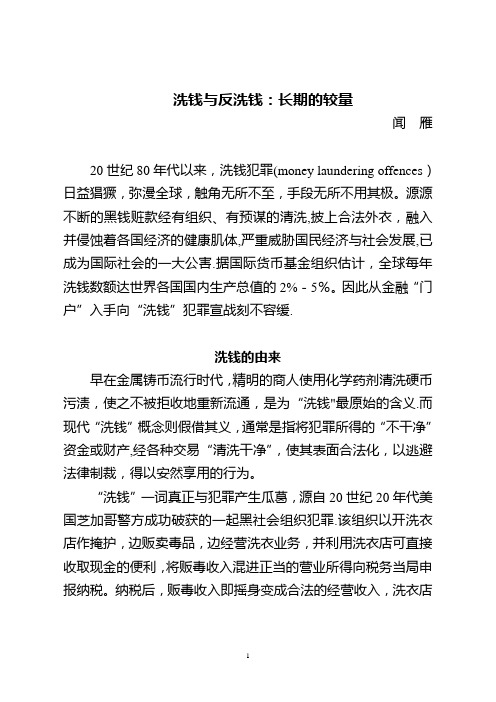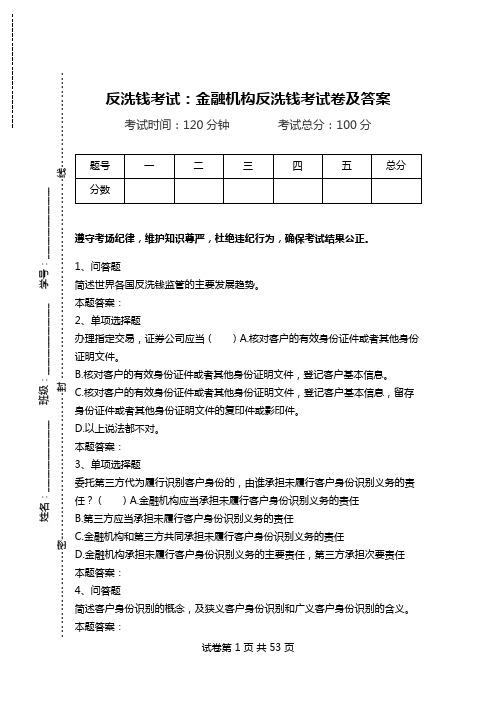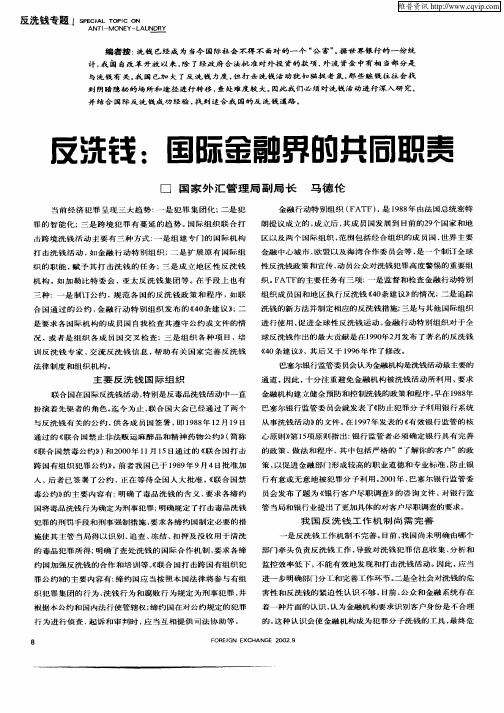巴塞尔银行监管委员会《关于防止犯罪分子利用银行系统洗钱的声明》(1998)
我国金融体系反洗钱犯罪法律控制的几点建议

我国金融体系反洗钱犯罪法律控制的几点建议作者:于凌来源:《消费导刊·理论版》2009年第13期[摘要]洗钱犯罪是困扰当今世界各国的一种复杂而隐蔽的国际性金融犯罪活动,它的存在不仅给世界经济的发展造成不可估量的损失,也给各国金融工业的健康发展带来了巨大的负面影响。
文章针对我国金融体系反洗钱犯罪法律控制的几点建议。
随着经济的快速发展,洗钱犯罪日益猖獗,其范围之广,手段之复杂,危害性之严重都远远超过了一般的犯罪行为。
洗钱犯罪是困扰当今世界各国的一种复杂而隐蔽的国际性金融犯罪活动,它的存在不仅给世界经济的发展造成不可估量的损失,也给各国金融工业的健康发展带来了巨大的负面影响。
洗钱者通常利用金融机构作为隐瞒或掩饰犯罪收益的工具。
巴塞尔委员会在1988 年 12 月《防止罪犯使用银行系统洗钱的声明》中强调指出,防止洗钱的最重要的措施在于银行自身管理的完善。
银行要采取相关的措施防止其机构成为洗钱的渠道。
国际社会反洗钱的实践证明,金融机构承担法律义务验明客户身份、保存记录、披露可疑的大额资金交易、内部控制措施和政府对金融机构加强监管,是控制洗钱的至关重要的措施。
加强相关的金融监管工作,成为整个反洗钱犯罪法律控制体系的根本之处。
严峻的形势对金融体系提出了更高要求,加强反洗钱犯罪的法律控制体系,必须加强金融体系中的反洗钱工作。
为了预防洗钱活动,维护金融秩序,遏制洗钱犯罪及相关犯罪,我国于2007年1月1日实施了《中华人民共和国反洗钱法》,《金融机构反洗钱规定》等法律法规,对我国反洗钱监督管理、金融机构反洗钱义务、反洗钱调查、反洗钱国际合作及法律责任等都做了相应规定。
由于我国反洗钱立法时间不长,与国际上先进的反洗钱立法相比,还存在一定差距,我国金融体系中反洗钱犯罪的法律控制应进一步完善。
一、建议扩大有关反洗钱法律规定的适用范围我国《金融机构反洗钱规定》第二条规定:本规定适用于在中华人民共和国境内依法设立的下列金融机构:(一)商业银行、城市信用合作社、农村信用合作社、邮政储汇机构、政策性银行;(二)证券公司、期货经纪公司、基金管理公司;(三)保险公司、保险资产管理公司;(四)信托投资公司、金融资产管理公司、财务公司、金融租赁公司、汽车金融公司、货币经纪公司;(五)中国人民银行确定并公布的其他金融机构。
2023年中级银行从业资格之中级银行业法律法规与综合能力全真模拟考试试卷A卷含答案

2023年中级银行从业资格之中级银行业法律法规与综合能力全真模拟考试试卷A卷含答案单选题(共30题)1、就监督管理部分而言,第十届全国人民代表大会常务委员会第六次会议通过的《中国人民银行法修正案》修订的重点是()。
A.中国人民银行开始行使反洗钱的职能B.中国人民银行开始行使直接检查监督权C.中国人民银行开始行使直接审批金融机构的职能D.中国人民银行将对银行业的监管职能划分出来,移交给银监会【答案】 C2、中国反洗钱监测分析中心由( )设立。
A.中国银行业监督管理委员会B.财政部C.中国人民银行D.国家外汇管理局【答案】 C3、以下不是《行政诉讼法》设立的目的是()A.防止和纠正违法的或者不当的具体行政行为B.保证人民法院正确、及时审理行政案件C.保护公民、法人和其他组织的合法权益D.维护和监督行政机关依法行使行政职权【答案】 A4、银行业是一个高度依赖负债经营的行业,声誉是银行的生命线,( )是银行业从业人员的立身之本。
A.守法合规B.专业胜任C.品行正直D.勤勉尽职【答案】 C5、GDP是指在一国的领土范围内,本国居民和外国居民在一定时期内所生产的、以()表示的产品和劳务总值。
A.世界价格B.公允价格C.市场价格D.成本价格【答案】 C6、监管谈话是指监管人员为了解银行业金融机构的经营状况、风险状况和发展趋势而与其()进行的谈话。
A.股东B.董事、高级管理人员C.普通工作人员D.客户【答案】 B7、存放中央银行款项,是指商业银行存放在中央银行的资金,即()A.存款准备金B.法定存款准备金C.超额准备金D.库存现金【答案】 A8、由银行签发,承诺自己在见票时无条件支付确定金额给收款人或者持票人的票据是( )。
A.商业承兑汇票B.银行承兑汇票C.支票D.银行本票【答案】 D9、在诉讼时效期间进行中,因发生法定事由,致使已经经过的时效期间统归无效,待时效中断的事由消除后,诉讼时效期间重新计算的制度是()。
洗钱与反洗钱:长期的较量

洗钱与反洗钱:长期的较量闻雁20世纪80年代以来,洗钱犯罪(money laundering offences)日益猖獗,弥漫全球,触角无所不至,手段无所不用其极。
源源不断的黑钱赃款经有组织、有预谋的清洗,披上合法外衣,融入并侵蚀着各国经济的健康肌体,严重威胁国民经济与社会发展,已成为国际社会的一大公害.据国际货币基金组织估计,全球每年洗钱数额达世界各国国内生产总值的2%-5%。
因此从金融“门户”入手向“洗钱”犯罪宣战刻不容缓.洗钱的由来早在金属铸币流行时代,精明的商人使用化学药剂清洗硬币污渍,使之不被拒收地重新流通,是为“洗钱"最原始的含义.而现代“洗钱”概念则假借其义,通常是指将犯罪所得的“不干净”资金或财产,经各种交易“清洗干净”,使其表面合法化,以逃避法律制裁,得以安然享用的行为。
“洗钱”一词真正与犯罪产生瓜葛,源自20世纪20年代美国芝加哥警方成功破获的一起黑社会组织犯罪.该组织以开洗衣店作掩护,边贩卖毒品,边经营洗衣业务,并利用洗衣店可直接收取现金的便利,将贩毒收入混进正当的营业所得向税务当局申报纳税。
纳税后,贩毒收入即摇身变成合法的经营收入,洗衣店老板则可再办几家洗衣店,扩大犯罪的庇护所,或进行更大规模的贩毒。
此时洗衣店里毒资的真实面目被掩盖了。
洗钱的上游犯罪没有犯罪,就没有洗钱。
洗钱最早是为了洗清毒品犯罪收入,国际社会反洗钱的初衷也即是为了切断对毒品犯罪的资金支持。
早期国际反洗钱立法也仅将毒品犯罪作为洗钱的上游犯罪。
然而世界各国在司法实践中不断发现,除贩毒外,走私、贪污、诈骗、贿赂、逃税和黑社会组织犯罪均与洗钱紧密相关,特别是“9·11”事件后,恐怖主义和跨国有组织犯罪的资金供给更是依存于洗钱活动,洗钱成为各种跨国犯罪的“生命线".于是,各国反洗钱立法根据本国情况逐渐扩大和增加了对洗钱的上游犯罪的厘定,大有将一切洗清犯罪收入的行为确定为该罪的趋势。
目前,各国确定洗钱的上游犯罪有三种情况:一是指所有上游犯罪,代表国家有澳大利亚、芬兰、意大利和英国等;二是指严重犯罪,即在一定有期徒刑年限以上的犯罪才视为洗钱的上游犯罪,如新西兰(有期徒刑5年以上)、奥地利(有期徒刑3年以上)和瑞士(有期徒刑1年以上);三是列举特定非法行为(Specified Unlawful Activity, SUA)确定洗钱的上游犯罪,如美国(约250种)、加拿大(45种)和希腊(20种)。
金融机构反洗钱专题培训课件PPT

• 确保决策者、金融中心、执法 部门和金融监管部门之间有效 的合作
• 法人和法律协议的透明度
–防止洗钱活动非法利用法人或法 律安排,获取受益人、控制权、 信托等充分信息
• 国际合作
–执行《维也纳公约》(联合国禁 止非法贩运麻醉药品和精神药物 公约)、《巴勒莫公约》(联合 国打击跨国有组织犯罪国际公 约)、《1999年联合国禁止资助 恐主义公约》
•
(一)提供资金帐户的;
•
(二)协助将财产转换为现金
或者金融票据的;
•(三)通ຫໍສະໝຸດ 转帐或者其他结算方式协助资金转移的;
•
(四)协助将资金汇往境外的;
•
(五)以其他方法掩饰、隐瞒
犯罪的违法所得及其收益的来源和
性质的。
• 《金融机构反洗钱规定》中的定义: 洗钱是指将毒品犯罪、黑社会性质 的组织犯罪、恐活动犯罪、走私犯 罪或者其他犯罪的违法所得及其产 生的收益,通过各种手段掩饰、隐 瞒其来源和性质,使其在形式上合 法化的行为。
• 洗钱的规模
–1997年联合国估计全球犯罪集团 的洗钱为4000亿美元,占当年国 际贸易总额的8%。
–2001年联合国公布的全球洗钱数 额为1至3万亿美元,在世界金融 中心每年的洗钱规模为3000-5000 亿美元。
–国际货币基金组织估计目前全球 范围每年洗钱的规模占世界GDP总 量的2%-5%,即1万到1万5千亿美 元。
巴塞尔银行监管委员会
• 巴塞尔委员会关于防止犯罪利用银行系统洗钱 的原则声明:
• 银行和其他金融机构可以在无意间被用做转移或者存储得自犯罪行为的资金的中介。 罪犯及其同伙利用银行系统付款和将资金从一个帐户转往另一个帐户,掩盖资金的来 源和受益的所有人,以及通过保管设施保存银行票据。这些行为一般称之为洗钱。
反洗钱考试:金融机构反洗钱知识点.doc

反洗钱考试:金融机构反洗钱知识点 考试时间:120分钟 考试总分:100分遵守考场纪律,维护知识尊严,杜绝违纪行为,确保考试结果公正。
1、单项选择题 2004年5月,经国务院领导同意,反洗钱工作部际联席会议成员单位由原来的16家增至多少家?( )A.23 B.24 C.25 D.26 本题答案: 2、判断题 巴塞尔委员会的《关于防止利用银行系统洗钱的声明》针对保管箱业务专门提出了客户身份识别要求。
本题答案: 3、单项选择题 2006年6月28日,全国人大常委会对《刑法》第三百一十二条进行了修订,将该罪的行为模式由“窝藏、转移、收购或者代为销售”修改为( )A .窝藏、转移、收购或者以其他方法掩饰、隐瞒 B .窝藏、转移、收购、代为销售或者获取、占有、使用 C .以各种方法掩饰、隐瞒 D .窝藏、转移、收购、代为销售或者以其他方法掩饰、隐瞒 本题答案: 4、判断题 与客户签订期货经纪合同时,期货公司应核对客户有效身份证件,但当客户销姓名:________________ 班级:________________ 学号:________________--------------------密----------------------------------封 ----------------------------------------------线----------------------户时,期货公司无需再核对。
本题答案:5、问答题简述我国反洗钱法律法规对于金融机构建立健全反洗钱内控的基本要求。
本题答案:6、单项选择题按照金融行动特别工作组的“40+9”建议的要求,下列行业中哪个不属于客户身份识别制度适用的范围?()A.房地产销售商B.体育彩票C.珠宝商D.律师本题答案:7、单项选择题对于未按照规定对职工进行反洗钱培训的金融机构,可以:A.处二十万元以上五十万元以下罚款B.对直接负责的董事、高级管理人员和其他直接责任人员,处一万元以上五万元以下罚款C.情节严重的,建议有关金融监督管理机构责令停业整顿或者吊销其经营许可证D.情节严重的,建议有关金融监督管理机构依法责令金融机构对直接负责的董事、高级管理人员和其他直接责任人员给予纪律处分本题答案:8、判断题《反洗钱法》要求金融机构的董事会或监事会应当对反洗钱内部控制制度的有效实施负责。
反洗钱考试:金融机构反洗钱考试卷及答案.doc

反洗钱考试:金融机构反洗钱考试卷及答案 考试时间:120分钟 考试总分:100分遵守考场纪律,维护知识尊严,杜绝违纪行为,确保考试结果公正。
1、问答题 简述世界各国反洗钱监管的主要发展趋势。
本题答案: 2、单项选择题 办理指定交易,证券公司应当( )A.核对客户的有效身份证件或者其他身份证明文件。
B.核对客户的有效身份证件或者其他身份证明文件,登记客户基本信息。
C.核对客户的有效身份证件或者其他身份证明文件,登记客户基本信息,留存身份证件或者其他身份证明文件的复印件或影印件。
D.以上说法都不对。
本题答案: 3、单项选择题 委托第三方代为履行识别客户身份的,由谁承担未履行客户身份识别义务的责任?( )A.金融机构应当承担未履行客户身份识别义务的责任 B.第三方应当承担未履行客户身份识别义务的责任 C.金融机构和第三方共同承担未履行客户身份识别义务的责任 D.金融机构承担未履行客户身份识别义务的主要责任,第三方承担次要责任 本题答案: 4、问答题 简述客户身份识别的概念,及狭义客户身份识别和广义客户身份识别的含义。
本题答案:姓名:________________ 班级:________________ 学号:________________--------------------密----------------------------------封 ----------------------------------------------线----------------------5、判断题在发生洗钱案件时,金融机构的反洗钱内部控制制度往往成为行政机关和司法机关判断该金融机构和特定非金融机构有关工作人员是否承担相关法律责任的参考。
本题答案:6、单项选择题金融行动特别工作组对洗钱是如何定义的?()A.隐瞒或掩饰犯罪收益的真实来源和性质,使其在形式上合法化的行为。
B.凡隐匿或掩饰因犯罪行为所取得的财物的真实性质、来源、地点、流向及转移,或协助任何与非法活动有关系之人规避法律应负责任者,均属洗钱行为。
了解你的客户

了解你的客户--反洗钱基础制度“了解你的客户”(Know You Customer,简称KYC,也称“尽职调查”、“合理审慎”)。
要求金融机构了解客户的真实身份,识别特定资金与其真正所有人、受益人的关系,以便当局监测和控制洗钱活动;要求金融机构对政治公众人物及其关系密切者所开立账户进行强化审查;要求对跨境代理银行业务及类似业务给予更加严格的审查。
“了解你的客户”最早由巴塞尔银行监管委员会在《关于防止利用银行系统进行洗钱的声明》(1988年)中提出,现已成为反洗钱领域的基础制度。
正确的KYC制度是管理银行风险包括洗钱风险的一个重要因素。
KYC不只包括开户、登记簿和要求银行形成一个接受客户政策和一个客户等级确认制度,它还包括对高风险账户的深入了解,以及对有可疑行为的账户预先审查等内容。
因此,加强商业银行反洗钱工作的一条重要途径就是建立和执行KYC制度,从而在源头上控制洗钱犯罪行为的发生。
在执行KYC制度时,所需关注的主要环节包括:接受客户,识别客户,持续审查高风险账户,风险管理。
一、接受客户接受客户即为客户开立银行账户阶段。
在此环节,商业银行应按风险程度高低进行客户分类后,采取不同的开户方式。
对风险程度较低的客户,其开户手续可简化,根据《金融机构反洗钱规定》,要求客户出示真实有效的身份证件或者其他身份证明文件,进行核对并登记。
对敏感客户、高风险客户则可采取多种方式,如更多地了解客户职业、收入状况、住所、其开户目的与原因、希望通过账户所进行的活动、资金的主要来源、真实受益人等,以此来进行客户身份的核实。
商业银行对信用卡申请客户、VIP高端客户采用的回访制度一方面是为客户提供良好、全方位的服务;另一方面亦是商业银行执行KYC 制度的体现。
随着电话银行、网上银行业务迅速发展,非面对面客户群体也正不断扩大,而要识别这些客户及有效防范其风险交易,商业银行在审核、准予其开户时,仍应当通过直接与客户联系的方式,核实其所递交的开户资料真实性。
反洗钱:国际金融界的共同职责

通过 的 联 合 国禁 止 非 法贩 运 麻 醉 品和 精 神 药物 公 约 ) 简称 ) (
联 合 国 禁 毒 公 约 ) 2 0 年 l 月 1 和 00 1 51 过 的 《 合 国 打 击 3通 联 跨 国 有 组 织 犯 罪 公约 》 前 者 我 国 已于 l 8 。 9 9年 9月 41批 准 加 3 入 , 者 已 签署 了 公约 , 在 等待 全 国人 大 批准 。 联 合 国禁 后 正 《 毒 公 约 ) 主 要 内 容 有 : 确 了毒 品 洗 钱 的 含 义 、 求 各 缔 约 ) 的 明 要
国将 毒 品 洗 钱 行 为 确 定 为 刑 事 犯 罪 ; 确 规 定 了打 击 毒 品 洗 钱 明
心原 则 第 l 项 原 则指 出 : 行 监管 者 必须 确 定银 行具 有 完善 5 银 的政 策 、 法和 程 序 , 中包 括严 格 的 “ 做 其 了解 你 的客 户 ”的政
策 , 促 进 金融 部 门形 成较 高 的职 业 道德 和 专业 标 准 , 止银 以 防 行 有 意 或 无 意 地 被 犯 罪 分 子 利 用 。O 1 , 塞 尔 银 行 监 管 委 2O 年 巴 员 会 发 布 了 题 为 银 行 客 户 尽 职 调 查 的 咨 询 文 件 , 银 行 监 对 管 当 局 和 银 行 业 提 出 了更 加 具 体 的 对 客 户 尽 职 调 查 的 要 求 。
主 要 反 洗 钱 国 际 组 织
联 合 国 在 国 际 反 洗 钱 活 动 , 别是 反 毒 品 洗 钱 活 动 中 一 直 特 扮 演 着 先 驱 者 的 角 色 。 今 为 止 , 合 国 大 会 已 经 通 过 了 两 个 迄 联 与 反洗 钱 有关 的 公 约 , 各成 员国 签 署 , l8 年 l 月 l 供 即 98 2 9日
- 1、下载文档前请自行甄别文档内容的完整性,平台不提供额外的编辑、内容补充、找答案等附加服务。
- 2、"仅部分预览"的文档,不可在线预览部分如存在完整性等问题,可反馈申请退款(可完整预览的文档不适用该条件!)。
- 3、如文档侵犯您的权益,请联系客服反馈,我们会尽快为您处理(人工客服工作时间:9:00-18:30)。
巴塞尔银行监管委员会《关于防止犯罪分子利用银行系统洗钱的声明》(1998)Prevention of Criminal Use of the Banking System For the Purpose of Money-Laundering ( 1998)背景:巴塞尔银行监管委员会(以下简称委员会)的成员由西方10国集团(实际上是12个发达国家:比利时、加拿大、法国、德国、意大利、日本、荷兰、瑞典、瑞士、英国、美国和卢森堡)的中央银行和金融监管机构组成,于1975年成立。
秘书处设在位于巴塞尔的国际清算银行,其宗旨是促进国际在银行监管事宜上的合作。
《关于防止犯罪分子利用银行系统洗钱的声明》于1998年12月通过。
其中分为前言和原则声明两个部分。
整个声明的全部内容都与反洗钱活动密切相关,故在此引用其全部内容。
Preamble[1]1. Banks and other financial institutions may be unwittingly[2] used as intermediaries for the transfer or deposit of funds derived from criminal activity. Criminals and their associates[3] use the financial system to make payments and transfers of funds from one account to another; to hide the source and beneficial ownership of money; and to provide storage for bank-notes through a safe deposit facility[4]. These activities are commonly referred to as money-laundering.2. Efforts undertaken hitherto[5] with the objective of preventing the banking system from being used in this way have largely been undertaken by judicial and regulatory agencies at national level. However, the increasing international dimension of organised criminal activity,notably in relation to the narcotics trade, has prompted[6] collaborative initiatives at the international level. One of the earliest such initiatives was undertaken by the Committee of Ministers of the Council of Europe[7] in June 1980. In its report the Committee of Ministers concluded that "... the banking system can play a highly effective preventive role while the cooperation of the banks also assists in the repression[8] of such criminal acts by the judicial authorities and the police".In recent years the issue of how to prevent criminals laundering the proceeds of crime through the financial system has attracted increasing attention from legislative authorities, law enforcement agencies and banking supervisors in a number of countries.3. The various national banking supervisory authorities represented on the Basle Committee on Banking Regulations and Supervisory Practices[9] do not have the same roles and responsibilities in relation to the suppression of money-laundering. In some countries supervisors have a specific responsibility in this field; in others they may have no direct responsibility. This reflects the role of banking supervision, the primary function of which is to maintain the overall financial stability and soundness of banks rather than to ensure that individual transactions conducted by bank customers are legitimate. Nevertheless, despite the limits in some countries on their specific responsibility, all members of the Committee firmly believe that supervisors cannot be indifferent to the use made of banks by criminals.4. Public confidence in banks, and hence their stability, can be undermined by adverse publicity as a result of inadvertent[10] association by banks with criminals. In addition, banks may lay themselves open to direct losses from fraud, either through negligence in screening[11] undesirable customers or where the integrity of their own officers has been undermined through association with criminals. For these reasons the members of the Basle Committee consider that banking supervisors have a general role to encourage ethical standards of professional conduct among banks and other financial institutions.5. The Committee believes that one way to promote this objective, consistent with differences in national supervisory practice, is to obtain international agreement to a Statement of Principles[12] to which financial institutions should be expected to adhere.6. The attached Statement is a general statement of ethical principles which encourages banks’ management to put in place effective procedures to ensure that all persons conducting business with their institutions are properly identified; that transactions that do not appear legitimate are discouraged; and that cooperation with law enforcement agencies is achieved. The Statement is not a legal document and its implementation will depend on national practice and law.In particular, it should be noted that in some countries banks may be subject to additional more stringent[13] legal regulations in this field and the Statement is not intended to replace or diminish those requirements. Whatever the legal position in different countries, the Committee considers that the first and most important safeguard against money-laundering is the integrity of banks’ own managements and their vigilant[14] determination to prevent their institutions becoming associated with criminals or being used as a channel for money-laundering. The Statement is intended to reinforce those standards of conduct.7. The supervisory authorities represented on the Committee support the principles set out in the Statement. To the extent that these matters fall within the competence of supervisory authorities in different member countries, the authorities will recommend and encourage all banks to adopt policies and practices consistent with the Statement. With a view to its acceptance worldwide, the Committee would also commend the Statement to supervisory authorities in other countries.Statement of PrinciplesI. PurposeBanks and other financial institutions may unwittingly be used as intermediaries for the transfer or deposit of money derived from criminal activity. The intention behind such transactions is often to hide the beneficial ownership of funds. The use of the financial system in this way is of direct concern to police and other law enforcement agencies; it is also a matter of concern to banking supervisors and banks’ managements, since public confidence in banks may be undermined through their association with criminals.This Statement of Principles is intended to outline some basic policies and pro cedures that banks’ managements should ensure are in place within their institutions with a view to assisting in the suppression of money-laundering through the banking system, national and international. The Statement thus sets out to reinforce existing best practices among banks and, specifically, to encourage vigilance against criminal use of the payments system, implementation by banks of effective preventive safeguards, and cooperation with law enforcement agencies.II. Customer identificationWith a view to ensuring that the financial system is not used as a channel for criminal funds, banks should make reasonable efforts to determine the true identity of all customers requesting the institution’s services. Particular care should be taken t o identify the ownership of all accounts and those using safe-custody facilities[15]. All banks should institute effective procedures for obtaining identification from new customers. It should be an explicit policy that significant business transactions will not be conducted with customers who fail to provide evidence of their identity.III. Compliance with lawsBanks’ management should ensure that business is conducted in conformity with high ethical standards and that laws and regulations pertaining[16] to financial transactions are adhered to. As regards transactions executed on behalf of customers, it is accepted that banks may have no means of knowing whether the transaction stems from or forms part of criminal activity. Similarly, in an international context it may be difficult to ensure that cross-border transactions on behalf of customers are in compliance with the regulations of another country. Nevertheless, banks should not set out to offer services or provide active assistance in transactions which they have good reason to suppose are associated with money-laundering activities.IV. Cooperation with law enforcement authoritiesBanks should cooperate fully with national law enforcement authorities to the extent permitted by specific local regulations relating to customer confidentiality. Care should be taken to avoid providing support or assistance to customers seeking to deceive law enforcement agencies through the provision of altered, incomplete or misleading information. Where banks become aware of facts which lead to the reasonable presumption that money held on deposit derives from criminal activity or that transactions entered into are themselves criminal in purpose, appropriate measures, consistent with the law, should be taken, for example, to deny assistance, sever relations with the customer and close or freeze accounts.[17]V. Adherence to the StatementAll banks should formally adopt policies consistent with the principles set out in this Statement and should ensure that all members of their staff concerned, wherever located, are informed of the bank’s policy in this regard. Attention should be given to staff training in matters covered by the Statement. To promote adherence to these principles, banks should implement specific procedures for customer identification and for retaining internal records of transactions. Arrangements for internal audit may need to be extended in order to establish an effective means of testing for general compliance with the Statement.--------------------------------------------------------------------------------[1] preamble[pri:5Ambl] 前言,序文[2] unwittingly[Qn5witiNli] 不知情地,无意地[3] associate[E5sEuFieit] 同伙[4] safe deposit facility:保险箱业务[5] hitherto[7hiTE5tu:] 迄今为止[6] prompt[prCmpt] 促使[7] committee of Ministers of the Council of Europe:欧洲理事会部长委员会[8] repression[ri5preFEn] 抑制[9] basle Committee on Banking Regulations and Supervisory Practices:巴塞尔银行规则和监管事务委员会[10] inadvertent[7inEd5vE:tEnt] 无意的[11] screen[skri:n] 审查,筛选[12] Statement of Principles:原则声明[13] stringent[5strindVEnt] 迫切的,严格的[14] vigilant[5vidVilEnt] 警醒的,警惕的[15] safe-custody facilities:保管箱业务,银行提供给客户的除了存贷款以外的一种中间业务[16] pertaining[pE(:)5teiniN] 附属,属于,关于[17] Where banks become aware of facts ……close or freeze accounts:当银行得知可以从中推断存款资金可能源自犯罪或参与交易本身就是犯罪的事实时,它应根据法律的规定采取适当的措施,如拒绝协助、断绝与客户的关系和关闭或冻结账户。
